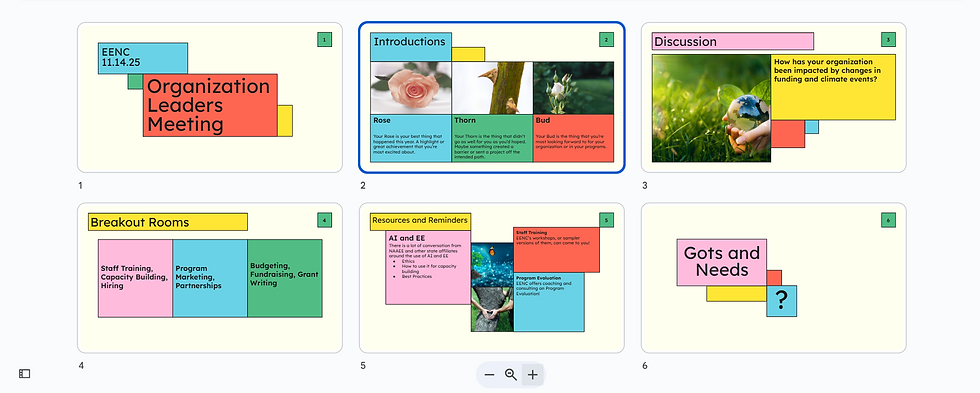Why I'm in EE, by Eastern Section Chair Elissa Anderson
- EENC Staff Team
- Aug 18, 2019
- 3 min read
Updated: Aug 17, 2023
My name is Elissa, and I am the Eastern Section Chair. As a child, I spent countless hours outdoors. I was born and raised in rural Georgia, and the outside world was my playground. Climbing trees, catching frogs and salamanders in creeks, hiking, hunting, fishing, swimming in ponds, helping my parents in the garden, and so many other activities. These early adventures helped shape me into an adult who has a passion for environmental stewardship and a desire to share that passion with others.
I strongly believe in connecting children to nature at a young age by providing them meaningful outdoor experiences. Today’s children spend too much time indoors and on devices, and we’re at risk of the next generation losing the respect and connection to Mother Earth that is so important for her survival. People who are not taught to love the Earth do not nurture, provide, and take care of her. It seems that almost every day we see something on the news about climate change, animals perishing from consuming discarded plastic, and extreme weather. The environmental problems we are facing as a society are numerous, and it’s up to us and the ones who follow to change the path we have been on of not having a loving, respectful, and caring connection to our planet. I strongly feel that if we do not change our actions and work to ensure others change theirs, we will be the cause of our own extinction. This is why environmental education for all is so important.
With children, instilling a love and respect for our environment in children at a young age helps them grow and develop into responsible adults who feel a personal sense of stewardship to help protect our environment now and in the future. Many educators focus on children, but adults are need of education as well. We all, as humans, have the capacity for change. I’ve found that with many adults and caring for our environment; it’s not that they don’t care, they simply don’t know. Take cigarette butts for example. Many people believe that cigarette butts are made of paper that will biodegrade if thrown on the ground. While this may be true of hand-rolled cigarettes, the reality is that commercially produced cigarette butts are made of a type of plastic called cellulose acetate. This plastic takes 125-150 years to break down, and it leaks toxic chemicals into the environment during this time. I’ve found that simply educating adults on this one major environmental issue causes many of them to change their actions regarding throwing their cigarette butts on the ground. Taking the time to have a simple conversation often results in positive change if we’re willing to take that educational leap.
One of my favorite ways to get children outside is a simple one: Go outside with them! Most adults don’t spend as much time in nature as they should (since nature is proven to be therapeutic on so many levels), and taking a kid outdoors is beneficial to you both. It’s amazing the things that can be found and explored together. Take for example this past Memorial Day weekend. We recently got married, and my husband and I went to Georgia over the weekend for a party with friends and family back home. We set the party up outside at the campsite. Yes, it was hot. Yes, it was muggy. Summer came early in Georgia this year. But, we did it. We set up tents for shade, had plenty of food and refreshments, and encouraged people to dress for the weather. During the party, I taught several children how to fish. While fishing, one little girl found a snake. As soon as she hollered my name, I came running over. It was an Eastern kingsnake, and I quickly grabbed it for an environmental education lesson. After a quick talk, we released the snake where we found it, and it went about its day as did I.
The universe presented me with an opportunity to enhance young (and old!) minds, and I took it. As an environmental educator, I jump on these opportunities when they are granted. We all have a responsibility to our planet, self, and each other to be environmental stewards and to nurture a world where humans have a mutually symbiotic relationship with nature. We are the warriors in this silent battle for saving the planet, and we must commit to the charge. As the saying goes, “We cannot force someone to hear a message they are not ready to receive, but we must never underestimate the power of planting a seed.”




Comments